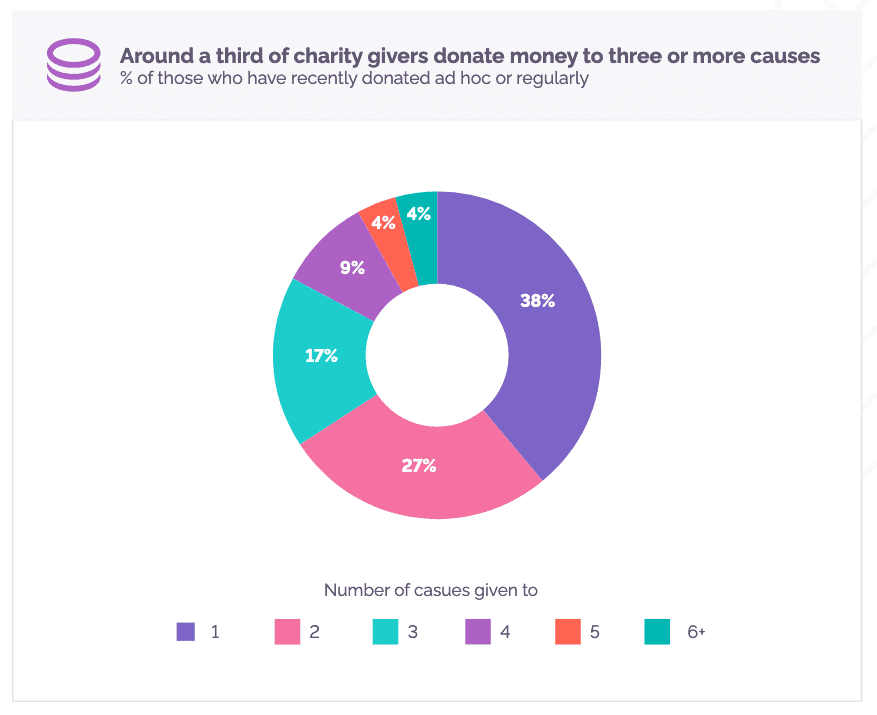Charity research round up. Issue 1.
Welcome to the first edition of Research Digest, a semi-regular round-up of research related to all things fundraising.
Once a month or so, we'll select some recently published research along with a selection of projects from the last few years that we think are worth a second look.
Bluefrog is an insight-led agency who believe that fundraising success comes from understanding what donors need. Over twenty-odd years, our own in-house research has shaped our ethos and helped us to drive transformational change for many of our clients.
If you have any research that you might like to share (we'd love to see any in-house research highlights) please drop us a line at [email protected] and we'll be in touch to discuss how we might feature it.
Alternatively if you'd like to chat about Bluefrog running some research for you, please email [email protected] and we'll share what we know and highlight how we could boost your income. We have experience of running research programmes in the UK, Ireland, Australia, Canada and the USA so no job is too large or small.
Happy reading.
Legacy Trends 2019
Smee and Ford. June 2019
This report is Smee and Ford's annual update on legacy trends covering the period between 2013 and 2018.
Key findings for this year (as lifted directly from the report) include:
- Annual legacy income is now over £3 billion – the highest figure ever recorded, up 10% from 2018
- 6.3% of the population leave a bequest in a Will
- 123,235 bequests were recorded in Wills, an increase from 122,849 in 2017
- There were 37,856 charitable estates reported. 16.7% of their value of charitable estates went to charities
- The typical profile of a legator is:
- Female
- Aged 77 when she writes her Will
- Dies when she is 89
- Lives in the South of England
- Leaves three charitable bequests in her Will
- 36.3% of charitable Wills contained just one bequest compared to 34.7% of charitable Wills in 2017 — the most popular cause for sole bequests is places of worship
- - - - -
What motivates people to give?
YouGov. June 2019
YouGov research has found that 29% of Brits have never donated money to charity and almost a third (32%) think that too much money is spent on administration (which is a problem of perception over reality).
In terms of how donors split their support, 38% of recent donors were reported to give to three or more causes:

… and “belief in the cause” was cited as the primary motivating factor for support:

The report also pays particular attention to:
- Reaching the next generation of supporters
- Charity brand rankings
- Animal charities Vs Human charities
- - - - -
How to change the world: What donors want from their philanthropy
Oxfam. March 2019.
Over two years, the Partnership Insight team at Oxfam carried out in-depth interviews with more than 60 philanthropists, advisors, experts and Trusts and Foundations.
Preliminary desk research identified a disparity between the aspirations of philanthropists and the (perceived) reality of how their gift would be spent and its impact.
According to the report, the main priorities for philanthropists were:
- A relationship with the charity and its representatives characterised by honesty, authenticity and trust.
- Opportunities for personal development and to use one’s own expertise to help the charity achieve its aims.
- A desire to invest their time and skills as well as their money.
- Recognition and demonstration of impact.
- - - - -
Understanding solicitation: Beyond the binary variable of being asked or not being asked
Beth Breeze and Gloria Jollymore. 2017.
In her 2017 paper, Beth Breeze seeks to address the fact that the body of academic research into what drives charitable giving has focussed on the supply-side of donations (the donors) rather than the demand-side (the solicitors).
Through 73 in-depth interviews with successful major donor fundraisers, she has investigated what factors - beyond the binary fact of being asked - contribute to successful fundraising.
The paper argues that there are no definitive characteristics that will predict the likelihood to give and that “situational factors (the ask) activate motivational factors (generosity)”.
Key findings include:
- Asks are made within relationships of trust. Interviewees spoke of the need to be authentic and create connection with donors.
- Successful asks depend on the fundraiser being able to find the common ground between the donor and organisation's needs.
- Long-term support relies on the fundraiser being able to make the experience as rich as possible e.g. recognition of support and demonstration of impact.
Whilst the paper is specifically focussed on major donors, clearly it does not require much of a leap to see how these findings are relevant to fundraisers working in individual giving and other fundraising disciplines.
- - - - -
Bullshit-sensitivity predicts prosocial behaviour
Arvid Erlandsson, Artur Nilsson, Gustav Tinghög, Daniel Västfjäll. July 2018

This is a light-hearted read that poses wider questions about our general ability for reflection and critical thinking in a world of 24/7 information and fake news.
The authors of this report are upfront about the fact that their study warrants further investigation and that correlation does not imply causation. However, they found that people who found it hard to distinguish pseudo-profound statements from genuinely profound statements were less likely to engage in pro-social behaviour (in this case self-reported donations to charity and a decision to volunteer for charity.
- - - - -
If you don’t already use this resource, CAF offers up bite-sized insights every month, all presented as a handy infographic.
Most recently they have looked at giving trends to small charities. This showed that the majority of respondents have supported a small charity, with a growing number of people able to name one.

You can access this report as well as all previous monthly insights here.
For something with a bit more substance, CAF published their 2019 UK Giving report in May. You can read a more detailed analysis of the findings here.
Tags In
Related Posts
1 Comment
Comments are closed.
The Essentials

Crack the Code to Regular Giving: Insights, Strategies, and a Special Giveaway!

‘Tis Halloween. Keep to the light and beware the Four Fundraisers of the Apocalypse!

Why do people give? The Donor Participation Project with Louis Diez.

A guide to fundraising on the back of a postcard

What does the latest research tell us about the state of fundraising?






[…] you ever wonder what reports you can really trust? Mark Phillips over the pond at Bluefrog has launched Research Digest, a semi-regular round-up of research related to all things fundraising, and I suggest you follow […]